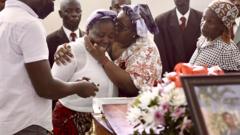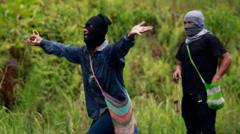The tragic death of a 16-year-old boy during opposition protests in Mozambique highlights the escalating violence in the nation's political landscape, as children mourn their lost friends amidst a backdrop of unrest and grief.
Children Killed in Mozambique Protests Spark Outrage and Grief

Children Killed in Mozambique Protests Spark Outrage and Grief
Tragic incidents during political protests in Mozambique claim young lives, igniting fears over safety and governmental response.
The mourners at a recent funeral in Mozambique's capital, Maputo, were predominantly young, encapsulating the heavy toll the political crisis is taking on the nation's youths. Sixteen-year-old Antonio Juaqim was shot dead while participating in an opposition-led protest against last month’s controversial presidential election outcome. His uncle, Manuel Samuel, recounted the horrifying moment when Antonio was struck in the mouth by a bullet that exited through the back of his head, a startling reminder of the dangers surrounding civic expression in Mozambique.
The father of a child lost to gunfire during the protests emphasized the tragedy of his son being a victim of political violence. Following the electoral commission's ruling that the ruling party Frelimo received 71% of the votes, opposition leader Venâncio Mondlane, who accused the government of electoral fraud, has sparked public outcry. Although the electoral results were contested, Mondlane’s calls for protests have resonated particularly among the youth, who have taken to banging pots and pans at 9 p.m. every night to express their disapproval of the government's 49-year rule.
While the protests initially drew throngs of participants, subsequent gatherings turned deadly after police reportedly opened fire on demonstrators, resulting in numerous fatalities, including children. Human rights organizations have reported approximately 40 deaths linked to police action during the protests. The police commander, Bernadino Raphael, expressed condolences but asserted that the demonstrators’ actions had led to violent encounters, shifting the blame onto Mondlane's supporters.
This environment of fear and anger has inspired further expressions of dissent; mourners have taken to stopping vehicles and honking horns in honor of the victims. The tragic losses fuel a growing apprehension among many young Mozambicans as they seek a pathway towards political reform and economic independence, prioritizing their futures over historical grievances related to the fight for independence.
The current crisis underscores the urgent need for resolution as the nation grapples with the effects of escalating violence, and the rising demand for transparency and accountability from the government grows louder amid the grief stricken populace. The deaths of young individuals like Antonio and Alito Momad symbolize a desperate plea for justice and change in a country facing one of its most challenging times since adopting multi-party democracy.
The father of a child lost to gunfire during the protests emphasized the tragedy of his son being a victim of political violence. Following the electoral commission's ruling that the ruling party Frelimo received 71% of the votes, opposition leader Venâncio Mondlane, who accused the government of electoral fraud, has sparked public outcry. Although the electoral results were contested, Mondlane’s calls for protests have resonated particularly among the youth, who have taken to banging pots and pans at 9 p.m. every night to express their disapproval of the government's 49-year rule.
While the protests initially drew throngs of participants, subsequent gatherings turned deadly after police reportedly opened fire on demonstrators, resulting in numerous fatalities, including children. Human rights organizations have reported approximately 40 deaths linked to police action during the protests. The police commander, Bernadino Raphael, expressed condolences but asserted that the demonstrators’ actions had led to violent encounters, shifting the blame onto Mondlane's supporters.
This environment of fear and anger has inspired further expressions of dissent; mourners have taken to stopping vehicles and honking horns in honor of the victims. The tragic losses fuel a growing apprehension among many young Mozambicans as they seek a pathway towards political reform and economic independence, prioritizing their futures over historical grievances related to the fight for independence.
The current crisis underscores the urgent need for resolution as the nation grapples with the effects of escalating violence, and the rising demand for transparency and accountability from the government grows louder amid the grief stricken populace. The deaths of young individuals like Antonio and Alito Momad symbolize a desperate plea for justice and change in a country facing one of its most challenging times since adopting multi-party democracy.




















